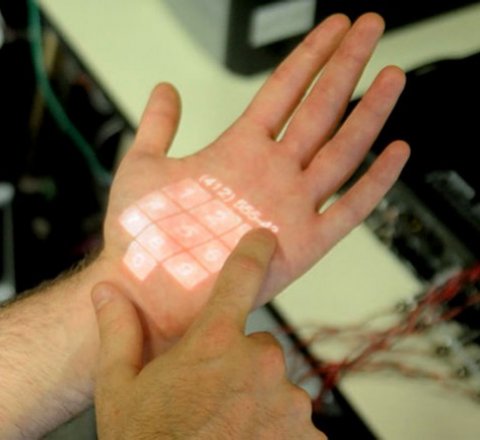Calling upon dwindling reserves of benevolence, I try to convince myself that Chris Harrison has the good of mankind at heart. I try to believe that
he honestly believes he's advancing the human condition, so much so that he will stand alongside Jonas Salk, Thomas Edison, the Wright Brothers, and George Crum (inventor of the honest-to-goodness randomly shaped, grease-fried potato chip, for those who slept through history class) in the pantheon of game-changers.
He doesn't
intend to nauseate me, I assure myself, but he does - like, well, a Pringle.
Harrison, you see, views the human body not as the astoundingly complex organism it is, but as the practical computer interface it could be if only the creator had exercised a little more imagination. He envisions a world where the question
"Are you PC or Mac?" creeps dangerously close to literal, a world where hands and forearms become computer keyboards and screens.
To that end, he’s developed a system he calls Skinput, which among other abominations would allow individuals - through the use of a "pico-projector"- to "display an image of a digital keyboard on their forearm and send text messages by tapping their arm in certain places without having to pull the phone out of a pocket or purse."
It was Bobby Kennedy who famously said, “There are those who look at things the way they are, and ask why...I dream of things that never were, and ask why not?” If I might paraphrase RFK, I’ve looked at my limbs the way they are, and ask why is that not sufficient?
On behalf of those delicate few for whom pulling a phone out of a pocket apparently exacts a physical toll I begrudgingly thank Chris. For the rest of us, I humbly offer an alternate view: perhaps life has gotten easy enough if we’re seeking cures for negligible movement. Should our little PC components - sorry,
grandchildren - really have to read history books to learn of the hardscrabble days when people had to physically touch things and pick them up?
Skinput works through a set of armbands and braces lined with sensors. The technology reads the sound waves produced when particular gestures are made or a particular finger taps another finger or palm or forearm, relaying the sound-wave information to the person's phone, enabling him or her to call, say, Uncle Skippy just by making the requisite “call Uncle Skippy” hand and arm movements.
Impressive technology, for sure, but its application is akin to using Salk’s polio vaccine as toilet bowl cleaner. We're to assume, I suppose, that this choreographed stupidity is easier than hitting the Uncle Skippy button on the phone's contact list. Whoops! I almost forgot! Doing that necessitates reaching into a pocket first in order to retrieve -
and lift - said phone. Ouch.
At least for the time being it seems other ancient activities, such as gripping, throwing, and hugging are acceptable to Harrison (as, no doubt, is patting oneself on the back for conceiving so clever a name as "Skinput"). I do suspect, however, that he considers these actions mere grunt-work, "legacy" functionalities screaming for modernization. "It's time," I can almost hear him say in his Nobel Prize acceptance speech, "to demand better from our extremities!"
Ironically, as one justification for Skinput, Harrison cites (fabricates?) dissatisfaction with the iPhone, one of the more recent once-in-a-lifetime gadgets certain to, ahem, simplify our existence. Well, in Harrison's estimation at least, the iPhone has fallen short on that front, leaving it to him to pick up the mantle and eradicate the blight of trifling inconvenience from the face of the Earth.
Quoted in a predictably uncritical story posted on CNN.com in 2010 (written by yet another entranced disciple of technology's "new = good" axiom), Harrison dares to take on the iPhone.
| | | "People don't love the iPhone keyboard. They use them. But they don't love them. If you can make the iPhone keyboard as big as an arm - that would be huge." |
So let me get this straight. The rationale for Skinput is that it's no longer enough for a keyboard to be functional? It must be loved? And love requires the surrender of an appendage? Yikes.
Harrison goes on,
| | | "The most profound achievement of Skinput is that the human body can be used as a sensor...literally, computing is always available. A person might walk toward their home, tap their palm to unlock the door and then tap some virtual buttons on their arms to turn on the TV and start flipping through the channels. It's almost like magic." |
Magic, perhaps, but even in this utopian scenario, Harrison has left some work undone. First, there seems to be some sort of "walking" expectation. Really now. And after we "walk" to the front door, are we then expected to physically push it open? What are we, Luddites? Then, there's all this tapping. Tapping must eventually be eliminated.
Perhaps at that point Harrison and his ilk will finally be satisfied: when we're all living a bland, intricately designed, and residue-free "Pringle" existence, and I'm perpetually nauseated.
